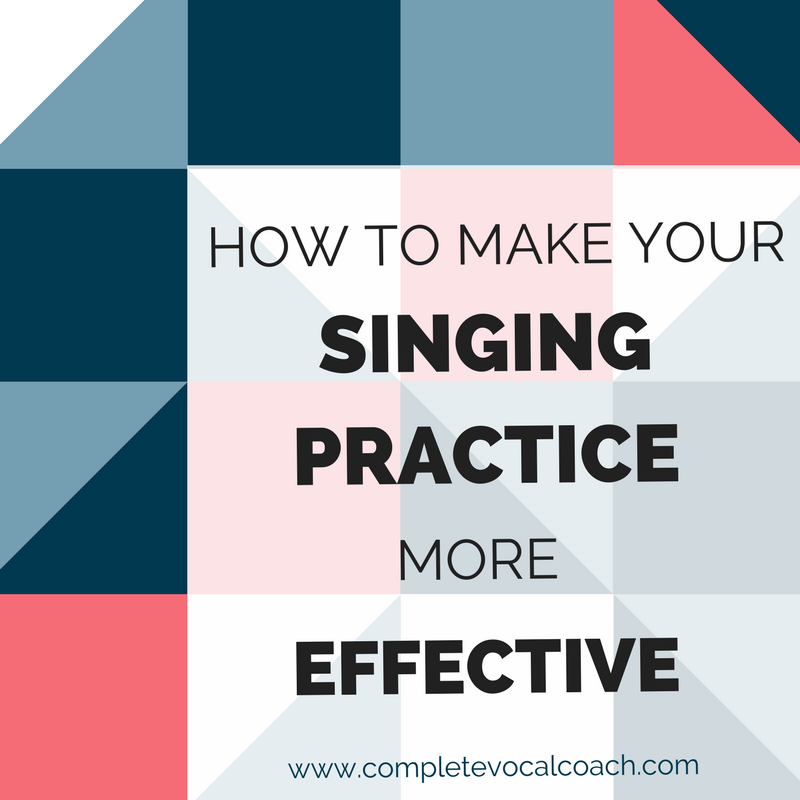Effective practice has got all to do with setting clear goals, and focusing on quality instead of quantity. Here are six tips that will help you make your practice sessions more effective!
1. FOCUS
Set a clear focus for your practice session. Know what you want to work on, and don’t try to work on too many things at the same time. This means knowing what the ‘problem areas’ in your songs are. A singing teacher can help you find out what the cause of your issue is, give you suggestions and tools on how to solve it, and assign you exercises to practice new skills.
Let’s say, that you are experiencing wobbly endings on notes and phrases, and your singing teacher has presented you with solutions and exercises for this problem. You could start your practice session by setting ‘endings’ as a theme for your session. Set the following intention: ‘I’ll focus on how I finish my notes and phrases’. Forget about all the other possible things that you might want to ‘fix’ for a while, and just stick with working on your endings.
Choir directors and coaches can also choose a theme for the session or rehearsal. Examples of technique themes are: vibrato, volume, twang, raising the larynx, and so on. Setting a focus also means that we are aware of not introducing too many tools or tasks at the same time. Asking the singers to focus on a technique related issue, while also expecting them to focus on timing, or choir choreography, usually results in unhappiness in some of the areas. Because none of us can really multitask with our focus, can we? No, not even women 😉
Setting an intention or a focus for your session is like zooming in on a specific detail on a photo. You are aware of the whole picture, but choose for a while to look at only one part of it.
2. QUALITY, NOT QUANTITY
Effective practice is not about how much you get done, but how you get it done. Whatever it is that we practice, it is better to perform simple exercises with a clear goal, than to perform many (complicated) exercises without a clear goal. This means avoiding singing scales or other exercises “on autopilot”, and instead, having a look at what the intention with the exercise is.
Simplifying the exercises is especially important when we are introduced to a new technique or sound. “Less is more” really applies here! It’s better to sing exercises with less notes, than to sing complicated arpeggios, interval leaps or scales. We need to be able to master singing one note with the new technique before we can move on to scales, interval leaps, and so on. Trying to do too much too soon doesn’t just cause frustration, but it can actually even cause you vocal trouble.
3. KEEP IT SHORT ENOUGH
In order to stay focused throughout your practice session, make sure the length of the session is helping you do that. Shorter and focused practice sessions with clear goals are far more effective than mindless, long practice or endless repetition of the same song or phrase. Also, when possible, try to focus your practice sessions to times of day when you have the most energy.

4. KEEP TRACK
Another way to add efficiency to your practice, is to keep track of your goals and findings. If something works out, make a note of what it is that you did, so that you can return to it another time. Your “clues” are depending on your individual learning style. Some people might focus on the position of their tongue, while others focus on a mental image. Recording your practice sessions and voice lessons is also extremely helpful, because that way you can hear (and see) the difference between what works and what doesn’t.
Check out my e-book Rock Your Singing Practice, where I have listed my favourite tools and resources to help you get the most out of your practice! You can get the e-book here for free:
5. BRING THE EXERCISES BACK TO THE SONG
Let’s face it, singing is not really about being able to perform exercises well. Exercises aren’t useful, unless you’re able to put the skills we learn into practice within the context of the songs you sing. Otherwise you’ll just get very good at singing exercises! 🙂
Choose your exercises based on the problems you encounter in your songs, and always try out if the skills you’ve learned through an exercise stand the test of putting it back into the context of the song. When something doesn’t go like you want it to, keep track of what it is that you did or didn’t do. That way you can go back and correct the problem. Sometimes you might have to adjust your exercise, or the way you perform the exercise. Here are some ideas: sing less notes, slow down the tempo, take out the words and just sing on the vowel sounds.
6. VARY PRACTICE WITH MAKING MUSIC
Finally, it’s important that we vary practice sessions with making music.
This is how I like to think about it: singers have a split personality of some sorts! There is a singer or an ‘artist’ in us, that wants to sing and make music because we have something to express, because it makes us feel good, because we love music, and so on.
There’s also another part in us – let’s call it the ‘technician’. The technician wants to practice, learn new skills and develop. It’s focused on details like technique, sound, timing, intonation, and so on. These two parts need to co-exist, but they can’t be equally present all the time.
A common reason for ineffective practice, next to not having clear enough goals, is mixing up the desire to practice with the desire to make music. What might help is to make a deal with yourself, and choose to say either ‘yes’ or ‘no’ to practice. Being focused when you practice technique and other details, means saying ‘yes’ to practice, and telling the ‘singer inside ourselves’ that it needs to step aside and allow the ‘technician’ to operate for a while.
On the other hand, give yourself permission to sometimes say a clear ‘no’ to practice. Saying ‘no’ to practice means you allow yourself to sing and make music without focusing on technique or other details. It means singing songs because you feel like singing, singing for the sake of expression. Saying ‘no’ to practice means telling the ‘technician’ inside ourselves that it has to step to the side for a while. And to allow things to perhaps be technically perfect, but still be able to enjoy singing and making music!
Also, be aware of when it is that you are saying ‘maybe’ to practice. This might happen more often than you think! ‘Maybe’ is when you’re not quite clear about our intentions. It’s an in-between state where a part of you ‘just wants to sing’, and a part of you wants to practice. ‘Maybe’ results in an unhappy singer, an unhappy ‘technician’, and ineffective practice. So satisfy your inner ‘technician’ with focused practice, and make your inner singer happy by making music and regularly singing your heart out!

